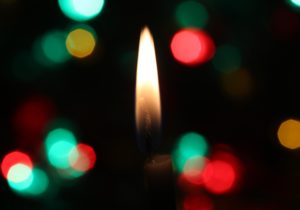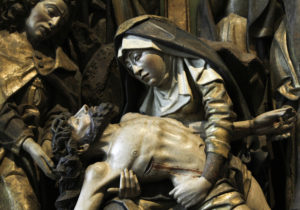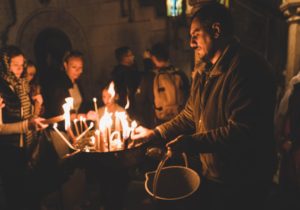Christmas is important to Christians because from their point of view the Baby Jesus is the meaning of Christmas, and the meaning of Christmas is the meaning of life.
This is the Feast of the Epiphany, and so the Yule Blog is drawing to a close for another year.
The Christmas season ends on a high note, with the Feast of the Epiphany—also known as Three Kings’ Day, the day on which Christians traditionally commemorate the visit of the Three Wise Men to the infant Christ.
As a kid, I always had some trouble understanding the business about the Three Wise Men and the gifts. There was that weird but compelling carol that they always sang in church on the Sunday closest to Epiphany. I must have been seven or eight years old by the time I figured out that “Orientare” is not the name of the country where the Three Kings came from.
And then there were the odd gifts they were bringing. Gold always comes in handy, so I could see why you would bring gold to a baby—but what on earth were frankincense and myrrh, and why would anybody give them to a child? I figured myrrh might have something to do with myrtle, like the crepe myrtles that bloom so beautifully in South Carolina. So maybe the myrrh was flowers for the mom?
The frankincense had me completely stumped, and it wasn’t until I visited Oman a few years ago that I really knew what it was or what it looked like: It’s the waxy resin of a tree that grows in the desert, and when burned it gives off a rich smell. It’s a principal ingredient of incense. If you are ever lucky enough to visit the astonishingly beautiful and welcoming country of Oman, you will have innumerable opportunities to buy some for yourself at many different qualities and price levels. If your trip is like mine, you will also have the experience of seeing roadkill camel on the highway, and you will visit the tomb of the prophet Job, where you will learn that he was 14 feet tall and a Muslim.
In any case, the gold and frankincense may refer to a prophecy of Isaiah. In the sixth verse of the sixtieth chapter, the prophet speaks of foreigners coming to the Holy Land with gifts of frankincense and gold; these foreigners are said to be riding camels, which may be why the Wise Men in manger scenes so frequently have camels in tow. Frankincense was a key ingredient of the incense burned before divine altars in ancient times. It is still sometimes used in Catholic, Orthodox, and high Anglican services today, but there is less need for it in the modern world than in the distant past. In the ancient world, altars were less a place of community meditation and gathering than a slaughterhouse; animals were killed on the altar and the process was not always clean. It got hot in the summer; without incense to cover the smell, few would have the hardihood to spend much time in the temple.
As for the myrrh, it is also an aromatic substance formed from the resin of trees found in the southern, wetter portions of the Arabian Peninsula. Like frankincense, with which it was frequently blended in ancient times, myrrh was (and is) believed to have medical properties. The word myrrh means “bitter,” though, and the resin turns dark with age. It is hard to improve on the words of the “We Three Kings” carol:
Myrrh is mine; its bitter perfume
Breathes a life of gathering gloom;
Sorrowing, sighing, bleeding, dying,
Sealed in the stone cold tomb.
With Epiphany, the Christmas season, at least in the West, has finally come to an end; the Wise Men reach the manger, give their weird gifts to the baby, and they, the Holy Family, and we move on to the next phase of our lives.
That also means the end of the Yule Blog, at least for now. It began with an introductory post on Christmas Eve with “The Thirteen Posts of Christmas,” and much of it was originally composed on a small island off the coast of Belize between bouts of scuba and snorkeling. I wish I were back there now as the freezing winter winds shake the windows and rattle the doors of my sturdy new apartment in Washington. But the next semester starts up pretty soon, and it’s time to revise the old syllabus and hunt up the old books. Thanks to all those who have followed my venture in Yule blogging, and especially to those who’ve sent encouraging comments my way.
Winston Churchill once dismissed a dessert complaining that “this pudding has no theme.” If this Christmas pudding of a blog has had a theme, it’s been the quest to interpret the meaning that seems to shape our lives and give them their depth and value. I’ve been trying to explore how the human quest for meaning shapes the way Christians approach the holiday of Christmas and to do that in a way that is helpful to anyone with an interest in the subject, whether Christian or not.
The Feast of the Epiphany is both the end of Christmas and its climax. The name comes from a Greek word that was classically translated as the manifestation or the “showing forth” of the Baby Jesus to the world, something that happened when the Three Wise Men saw the child whose birth they foretold from the stars. These days we use the English word “epiphany” in another sense; it now means an “aha” moment when you suddenly understand something. The old meaning referred to the transmission of information; the new meaning signifies its reception. Either way, it’s an apt name for today: It marks both the day on which Mary and God showed the baby to the world and the day when the world got its first dim understanding of what this child might mean.
This feast, also traditionally called the “Feast of Lights,” is a good day to look at the last of the three biblical passages that deal with the Christmas story. The Gospels of Matthew and Luke provide the narrative details of the story, and those are the ones we have looked at so far. The final source, the first 18 verses of the first chapter in the Gospel of John, says nothing about the details of Christmas: no shepherds, no angels, no chests of gold, and no myrrh—but it is perhaps the most profound meditation on what it all means to be found anywhere in the Bible.
It’s short enough, and important enough, that I’ve put the King James translation below. The vocabulary is so simple and the subject so profound that the archaic English of the 1611 King James translation is as clear as the more modern ones—and, at least to my archaic taste, more beautiful and suggestive. (For the non-Bible experts, the “John” to which this passage refers is not the John traditionally credited with writing this Gospel; it is John the Baptist, whose baptism of Jesus was the starting point for Jesus’ public career.)
In the beginning was the Word, and the Word was with God, and the Word was God.
The same was in the beginning with God.
All things were made by him; and without him was not any thing made that was made.
In him was life; and the life was the light of men.
And the light shineth in darkness; and the darkness comprehended it not.
There was a man sent from God, whose name was John.
The same came for a witness, to bear witness of the Light, that all men through him might believe.
He was not that Light, but was sent to bear witness of that Light.
That was the true Light, which lighteth every man that cometh into the world.
He was in the world, and the world was made by him, and the world knew him not.
He came unto his own, and his own received him not.
But as many as received him, to them gave he power to become the sons of God, even to them that believe on his name:
Which were born, not of blood, nor of the will of the flesh, nor of the will of man, but of God.
And the Word was made flesh, and dwelt among us, (and we beheld his glory, the glory as of the only begotten of the Father,) full of grace and truth.
John bare witness of him, and cried, saying, This was he of whom I spake, He that cometh after me is preferred before me: for he was before me.
And of his fulness have all we received, and grace for grace.
For the law was given by Moses, but grace and truth came by Jesus Christ.
No man hath seen God at any time; the only begotten Son, which is in the bosom of the Father, he hath declared him.
That opening phrase, “in the beginning,” is a conscious evocation of the start of the Hebrew scriptures; the Book of Genesis begins with a Hebrew word that when translated into English means the exact same thing. The Greek word that the King James translators (a collection of scholars convened by James I of England in the early 1600s to produce an official, standardized English translation that would replace what the king considered the too-Calvinist Geneva Bible widely used until then) translated as “Word” is “logos.” (Λογος for the Greek fans out there.) It’s an important word in classical Greek philosophy. We see it today in many forms in English; most notably, it is the root of our word “logic” and also of the “ology” in words like biology and psychology.
“Word” is a weak translation for “logos,” I think, although it’s hard to find a better. Logos is the ordinary way in which Greek speakers refer to the normal “words” of conversation and writing, but it also has a connotation of meaning and order that is missing in English. We should probably stick with “word” as the standard translation, but it’s a useful mental exercise to substitute “meaning” for “word” and re-read the start of the passage to catch this aspect of the Greek. So here are the first four verses again:
In the beginning was the Meaning, and the Meaning was with God, and the Meaning was God.
The same was in the beginning with God.
All things were made by him; and without him was not any thing made that was made.
In him was life; and the life was the light of men.
This is what I have been trying to get at all along in this blog: Christmas is important to Christians because from their point of view, the Baby Jesus is the meaning of Christmas, and the meaning of Christmas is the meaning of life. That meaning is the source of our life, the goal of our lives, and the light of all life and of all human beings. It has existed forever and somehow both lives with and is God on high, but It came into our world and into a Jewish family on a special day when Augustus Caesar ruled in Rome and Herod was king in Jerusalem. We had somehow lost touch with the Meaning of it all, but the Meaning hadn’t lost touch with us. It was intent on finding us anyway—and It did. That is what Christians have been celebrating since December 25 and what in many ways we go on celebrating all year.
Many Eastern Christians will begin their Julian-calendar Christmas tomorrow; for them today is Christmas Eve. Merry Christmas to you all!
For the rest of us, it’s back to the everyday world, which here in the infamously undrained Washington swamp can look a bit dreary on this January day. The nights are still long, the trees are still bare, and the days are still cold. But the cycle of the seasons has turned, and the peoples who dwelt in the darkness have seen a great light. And with that modestly hopeful thought, here endeth the 2019–20 Yule Blog with a final quotation from the last stanza of John Milton’s Nativity Ode, the greatest Christmas poem ever written in English:
But see the Virgin blest,
Hath laid her Babe to rest.
Time is our tedious Song should here have ending,
Heav’ns youngest-teemed Star
Hath fixt her polisht Car,
Her sleeping Lord with Handmaid Lamp attending.
And all about the Courtly Stable,
Bright-harnest Angels sit in order serviceable.







 Sponsor a student for Christianity & National Security 2024
Sponsor a student for Christianity & National Security 2024